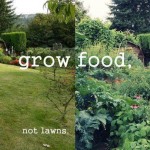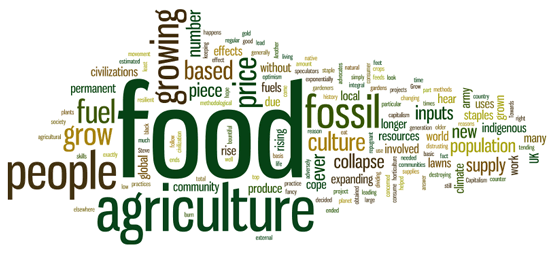During the last decade there has been a huge rise in the number of people here in the UK and elsewhere who have decided to grow their own food. It is estimated that up to a third of people in the UK now grow some of their own food, and this number is rising rapidly on a yearly basis as the price of food staples rockets. There are a number of reasons why people are growing their own food, in many cases people are distrusting and concerned at the particular methods that large scale agriculture uses to cultivate their food, this has led to a phrase that I have heard many times from new gardeners: ‘At least when you grow your own food you know exactly where its come from’ And this statement that I hear so regularly is very true, your produce has been grown by you, in your own living space and without all of the destructive agrochemical toxic inputs and fossil fuel that agriculture uses to grow food.
Food prices
 As I briefly mentioned at the beginning of this piece food prices have been rising constantly here and in the US, some of the price rise is linked to the effects of our changing climate on annually grown staple crops, agriculture itself effects our climate adversely through its massive use fossil fuels where we have ended up with a situation where agricultural inputs are leading to the collapse of agriculture. Another reason and one that is morally repugnant for the hike in the price of our food is that stock market speculators are gambling on the price of staples, which pushes up the price for people buying the food over the counter.
As I briefly mentioned at the beginning of this piece food prices have been rising constantly here and in the US, some of the price rise is linked to the effects of our changing climate on annually grown staple crops, agriculture itself effects our climate adversely through its massive use fossil fuels where we have ended up with a situation where agricultural inputs are leading to the collapse of agriculture. Another reason and one that is morally repugnant for the hike in the price of our food is that stock market speculators are gambling on the price of staples, which pushes up the price for people buying the food over the counter. 
History
If we look at how we have we have obtained our food in history agriculture is fairly new, where as horticulture is older and a much more resilient and low impact way of obtaining food and other plant based resources. If we generally compare civilizations who are advocates of agriculture to native indigenous cultures there is a methodological dividing line right down the middle, indigenous culture is horticultural in that their practices are tending to and looking after useful perennial plants in the natural environment over time, where as expanding civilizations exist in the form they do due to fossil fuel driven agriculture which up until how has been able to create food security which has helped to boost the global population, and a regular and bountiful supply of fresh produce for its ever expanding population. On top of our ever growing global population, Capitalism demands that we work harder and for longer, this has an effect on the calorific intake and the amount of food that people consume and can only lead to people having to eat more as they burn more energy working for capitalism.
Towards a permanent culture
But what happens when the fossil fuel age ends and there is no longer a supply of the old black gold, how would agriculture cope? The answer is that it wouldn’t cope at all; it would simply collapse due to its total dependence on external fossil fuel based inputs, the collapse of society and civilization would then follow. There is some optimism and hope in the fact that whilst there is still fossil fuels keeping agriculture on its feet, there is an ever growing army of people who are growing their own food, there are projects popping up all over the world, the food not lawns and community gardens movement is growing exponentially and in every country on earth.  As agriculture struggles to supply the world with food. This army of new food growers are in important and integral part of our transition from fossil fuel based consumer culture to a permanent culture that is based on local resource generation that feeds and supplies local communities with the basic resources needed to live a life of well being without destroying the planet in the process. If you are involved in a community food growing project or you grow from home, we would love to hear from you, and if you fancy writing a piece about the work that you are involved in we would put the piece on this website as a means of sharing skills and good practice.
As agriculture struggles to supply the world with food. This army of new food growers are in important and integral part of our transition from fossil fuel based consumer culture to a permanent culture that is based on local resource generation that feeds and supplies local communities with the basic resources needed to live a life of well being without destroying the planet in the process. If you are involved in a community food growing project or you grow from home, we would love to hear from you, and if you fancy writing a piece about the work that you are involved in we would put the piece on this website as a means of sharing skills and good practice.
Steve

